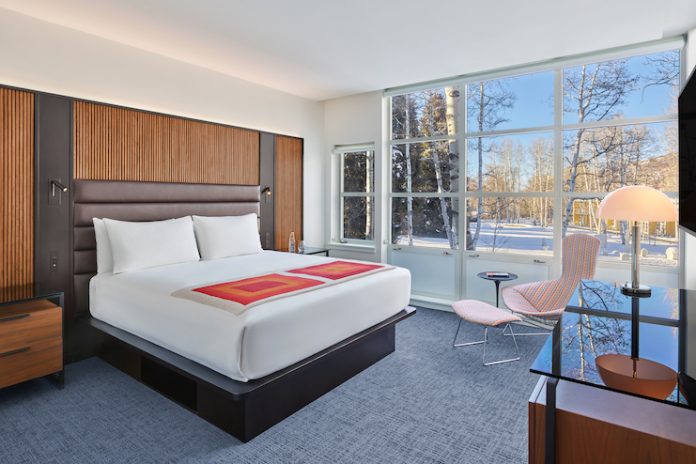
ASPEN, Colorado — Aspen Meadows Resort has unveiled a guest suite renovation that pays a primary color homage to the resort’s Bauhaus design roots.
Blending nature, art, and authenticity on 40 acres of rolling meadows and beautiful groves in the West End of Aspen, the resort has carefully respected the work of original designer Herbert Bayer while also meeting the expectations of the modern-day traveler. The 98 all-suite property, located within walking distance of Aspen’s world-class year-round outdoor pursuits, skiing, shopping, and restaurants has been renowned for its nature-inspired design and spacious accommodations.
Michael Suomi of Manhattan-based Suomi Design Works was commissioned to embrace the resort’s storied history and reimagine the interiors. The new design heavily features reds, blues, and yellows to represent the Bauhaus’ original primary color theory and adheres to the movement’s geometric principles. Some specialty legacy furniture like the Saarinen Tulip Tables and Bertoia Bird Chairs were carefully restored, while new pieces, like platform beds with underneath storage, were added for both comfort and convenience.
“This suite renovation has been delivered with great respect for our unique history and represents Aspen Meadows’ future and evolution,” said Richard Stettner, vice president of Aspen Campus Facilities and Operations for The Aspen Institute, which owns the resort. “Our all-suite accommodations remain among the most spacious in Aspen, and new and returning guests will appreciate the authentic nature of the enhancements.”
The renovation will be fully complete by April and is the latest in a series of notable improvements at the resort, which is now part of the Salamander Collection. The newly constructed Resnick Center for Herbert Bayer Studies opened last year while the historic Boettcher Building was also renovated. Further improvements to the Walter Isaacson Center and Plato’s restaurant are planned for the early fall of 2023, which will enhance the spatial connection to the outdoors and the mountain views.
Design Details
The renovated living areas feature new sun-lit work/dining areas with large tables for dining, working, and family games, along with a sleek blue leather banquette. The living spaces also include a Bauhaus-inspired sleeper sofa and updated coffee tables, end tables, and area lighting. Many rooms feature additional reading areas with settees and pendant lights, while original Ferenc Berko black-and-white photographs decorate the suite.
Every bedroom has new platform beds with integrated storage, dressers, and nightstands, as well as modern, recessed lighting and reading lamps in the headboards. Additionally, the renovation provides a technology boost with upgraded televisions, charging ports, and conveniently placed electrical outlets.
The enhanced suites also feature new bathrooms with lighter color schemes, as well as updated kitchenettes that include bar sinks, microwaves, and refrigerators. The arrival area also showcases a “drop station” for catching the gear and jackets required for Aspen and its outdoors. All suites have upgraded and new heating and air conditioning units, which tie into the property’s electricity grid powered by 100 percent renewable energy.
The History
In the early 1950s, Walter Paepcke, the founder of the Institute, commissioned the renowned Bauhaus architect and artist Herbert Bayer to transform farmland into a secluded destination where visitors could take a step back from their hurried lives and reflect upon a variety of important issues they faced.
Bayer was an influential modern artist and designer who studied and taught at the Bauhaus, an art school that was radical in its uniting of art, craft, and technology in the years following World War I. Bayer emigrated from Germany to the United States in 1938, and then relocated to Colorado in 1946.
Describing Aspen Meadows as a “total work of art,” Bayer wove outdoor walkways through his landscape architecture to remind visitors of their relationship with nature, mind, and body—which became known as the Aspen Idea. The grounds are rich with Bauhaus architecture and outdoor sculptures, and there is also an extensive collection of artwork found inside every building. To this day, the resort hosts the Institute’s famed array of programming, including the Aspen Ideas Festival.











